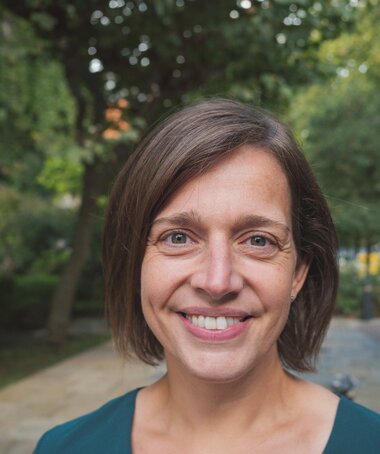Turning science into better healthcare
Prof Mieke Van Hemelrijck and Research Fellow Charlotte Moss describe their work with the Translational Oncology and Urology Research team.
They both successfully applied for the KHP staff development fund, and describe how it helped their research work.
Please introduce yourself and describe your role within KHP
 Prof Mieke Van Hemelrijck [pictured right], Professor of Cancer Epidemiology and Academic Lead of Guy’s Cancer Real World Evidence Programme.
Prof Mieke Van Hemelrijck [pictured right], Professor of Cancer Epidemiology and Academic Lead of Guy’s Cancer Real World Evidence Programme.
Charlotte Moss, Research Fellow in Implementation Sciences and Clinical Database Manager for Guy’s Cancer Real World Evidence Programme.
Tell us about the Translational Oncology and Urology Research (TOUR) team, and please describe some of the developments in the field and their potential to change people’s lives
The Translational Oncology and Urology Research (TOUR) team aims to turn science into better healthcare by translating uro-oncology research into medical practice. TOUR is led by Professor Mieke Van Hemelrijck, bringing together a team of researchers, clinicians, students, research nurses, trial coordinators, and database managers who are active across the field of translational research.
The translational research work of the group encompasses a heterogeneous set of activities in the area of prostate, bladder, renal, and testicular cancer, covering both bedside and bench. Moreover, Dr Van Hemelrijck leads Guy’s Cancer Real World Evidence (RWE) together with Dr Anne Rigg from Guy’s and St Thomas’ NHS Foundation Trust. The programme aims to amplify Guy’s Cancer RWE data science capability and allow progress answering challenging cancer research questions. Guy’s Cancer RWE will drive world class patient centred research.
Guy’s Cancer Real World Evidence (RWE) is a collaboration between epidemiologists at King’s College London and clinicians at Guy’s and St Thomas’ NHS Foundation Trust (FT), using anonymised routinely collected clinical patient data to guide quality improvement/research and patient care. In Spring 2020, we quickly shifted our research priorities to rapid high-quality data collection to produce findings that directly improved local cancer care pathways and (inter)national policy during the beginning of the COVID-19 outbreak.
At that time, the effects of the pandemic were still largely unknown and there was a gap in understanding what it meant for cancer patients in terms of oncological outcomes and quality of life. By undertaking a deep dive into the data and experience of the Trust, we were one of the first cohorts to investigate both the indirect and direct impact of COVID-19 on cancer care.
At the centre of this work, we have staff and patients who have extensively engaged with us through co-production. This was invaluable to us; without it, our research would not have accurately reflected their needs and priorities, ensured methods were feasible and appropriate and information was relevant and accessible.
Our findings allowed the Trust and wider NHS to pursue a range of improvements in patient care and staff well-being. For example, in mid-2020 we helped uncover that systemic anti-cancer treatment (SACT) was able to be continued at the Trust without any significant effects on the morbidity/mortality of patients. This information was key to clinical decision-making around SACT during COVID-19, impacting staff and patients.
You successfully applied for the KHP staff development fund, please describe the process
We filled out a short application form explaining the meeting we wanted to attend and how it would benefit our research work. The fund was used to cover our attendance at the European Implementation Science Event in Basel in June 2023.
What would be your top tips for anyone looking to enter the field of TOUR and cancer epidemiology?
Have an open mind and be keen on multidisciplinary collaborations with patients at the heart of everything you do.
For more information about TOUR, visit its webpage here.